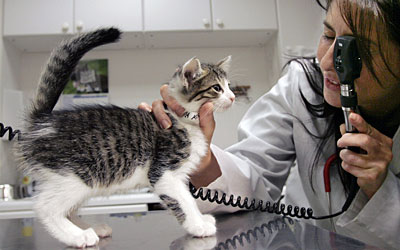
With approximately 34 million U.S. households owning at least one cat, it is important that cat owners become knowledgeable about taking the right precautions.
"One of the most important things that cat owners can do to ensure their pet's health is to have their kitten tested for feline leukemia virus (FeLV) and feline immunodeficiency virus (FIV)," explained cat expert Lynn Buzhardt. "Feline leukemia virus and feline immunodeficiency virus are two of the most deadly retroviruses affecting cats." The American Association of Feline Practitioners recommends testing all newly adopted cats and kittens for FIV and FeLV.
It is estimated that 31 million cats in the U.S. are at risk for the diseases, but only a small percentage of cats are being tested." Both diseases affect only cats and can not be spread to people.
There are often no visible signs of feline leukemia virus or feline immunodeficiency virus; the only way to know if a cat is infected is to test. "The good news is with early detection cats testing positive can be properly monitored and cared for," explained Dr. Lynn Buzhardt. "By knowing their cat's status, pet owners can also play an important role in curtailing the spread of feline leukemia virus and feline immunodeficiency virus to other cats by monitoring their cat's behavior around other cats."
For more information regarding feline leukemia virus and feline immunodeficiency virus, cat owners should contact their veterinarian.